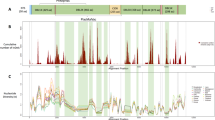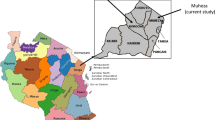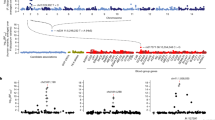Abstract
Resistance to chloroquine has been linked to polymorphisms within the pfcrt gene of the human malarial parasite Plasmodium falciparum. Here, we have investigated the prevalence of the pfcrt allele associated with chloroquine resistance in the peripheral blood and the placenta of pregnant women diagnosed with a P. falciparum infection. Our molecular epidemiological data show an unequal distribution with a significant under-representation of parasites carrying the mutated pfcrt allele in the placenta, as compared to the peripheral blood. In comparison, no differences were seen with regard to pfmdr1 polymorphisms of these parasites. Our data suggest a selective disadvantage of the polymorphic and a selective advantage of the wild-type pfcrt haplotype in the placenta, supporting the model that the human host provides various microenvironments that favor genetically distinct P. falciparum populations.
Similar content being viewed by others
References
Abdel-Muhsin AM, Mackinnon MJ, Ali E, Nassir el KA, Suleiman S, Ahmed S, Walliker D, Babiker HA (2004) Evolution of drug-resistance genes in Plasmodium falciparum in an area of seasonal malaria transmission in Eastern Sudan. J Infect Dis 189:1239–1244
Bray PG, Mungthin M, Hastings IM, Biagini GA, Saidu DK, Lakshmanan V, Johnson DJ, Hughes RH, Stocks PA, O'Neill PM, Fidock DA, Warhurst DC, Ward SA (2006) Pfcrt and the trans-vacuolar proton electrochemical gradient: regulating the access of chloroquine to ferriprotoporphyrin ix. Mol Microbiol 62:238–251
Djimde A, Doumbo OK, Cortese JF, Kayentao K, Doumbo S, Diourte Y, Dicko A, Su XZ, Nomura T, Fidock DA, Wellems TE, Plowe CV, Coulibaly D (2001) A molecular marker for chloroquine-resistant falciparum malaria. N Engl J Med 344:257–263
Duraisingh MT, Refour P (2005) Multiple drug resistance genes in malaria—from epistasis to epidemiology. Mol Microbiol 57:874–877
Fidock DA, Nomura T, Talley AK, Cooper RA, Dzekunov SM, Ferdig MT, Ursos LM, Sidhu AB, Naude B, Deitsch KW, Su XZ, Wootton JC, Roepe PD, Wellems TE (2000) Mutations in the P. falciparum digestive vacuole transmembrane protein pfcrt and evidence for their role in chloroquine resistance. Mol Cell 6:861–871
Gamain B, Smith JD, Viebig NK, Gysin J, Scherf A (2007) Pregnancy-associated malaria: parasite binding, natural immunity and vaccine development. Int J Parasitol 37:273–283
Hayward R, Saliba KJ, Kirk K (2005a) Pfmdr1 mutations associated with chloroquine resistance incur a fitness cost in Plasmodium falciparum. Mol Microbiol 55:1285–1295
Hayward R, Saliba KJ, Kirk K (2005b) Mutations in pfmdr1 modulate the sensitivity of Plasmodium falciparum to the intrinsic antiplasmodial activity of verapamil. Antimicrob Agents Chemother 49:840–842
Juliano JJ, Kwiek JJ, Cappell K, Mwapasa V, Meshnick SR (2007) Minority-variant pfcrt k76t mutations and chloroquine resistance, Malawi. Emerg Infect Dis 13:872–877
Liu DQ, Liu RJ, Ren DX, Gao DQ, Zhang CY, Qui CP, Cai XZ, Ling CF, Song AH, Tang X (1995) Changes in the resistance of Plasmodium falciparum to chloroquine in Hainan, China. Bull World Health Organ 73:483–486
Martin RE, Marchetti RV, Cowan AI, Howitt SM, Broer S, Kirk K (2009) Chloroquine transport via the malaria parasite's chloroquine resistance transporter. Science 325:1680–1682
Mayengue PI, Rieth H, Khattab A, Issifou S, Kremsner PG, Klinkert MQ, Ntoumi F (2004) Submicroscopic Plasmodium falciparum infections and multiplicity of infection in matched peripheral, placental and umbilical cord blood samples from Gabonese women. Trop Med Int Health 9:949–958
Mita T, Kaneko A, Lum JK, Bwijo B, Takechi M, Zungu IL, Tsukahara T, Tanabe K, Kobayakawa T, Bjorkman A (2003) Recovery of chloroquine sensitivity and low prevalence of the Plasmodium falciparum chloroquine resistance transporter gene mutation k76t following the discontinuance of chloroquine use in Malawi. Am J Trop Med Hyg 68:413–415
Mita T, Kaneko A, Lum JK, Zungu IL, Tsukahara T, Eto H, Kobayakawa T, Bjorkman A, Tanabe K (2004) Expansion of wild type allele rather than back mutation in pfcrt explains the recent recovery of chloroquine sensitivity of Plasmodium falciparum in Malawi. Mol Biochem Parasitol 135:159–163
Payne D (1987) Spread of chloroquine resistance in Plasmodium falciparum. Parasitol Today 3:241–246
Picot S, Olliaro P, de Monbrison F, Bienvenu AL, Price RN, Ringwald P (2009) A systematic review and meta-analysis of evidence for correlation between molecular markers of parasite resistance and treatment outcome in falciparum malaria. Malar J 8:89
Price RN, Cassar C, Brockman A, Duraisingh M, van Vugt M, White NJ, Nosten F, Krishna S (1999) The pfmdr1 gene is associated with a multidrug-resistant phenotype in Plasmodium falciparum from the western border of Thailand. Antimicrob Agents Chemother 43:2943–2949
Ranford-Cartwright LC, Taylor J, Umasunthar T, Taylor LH, Babiker HA, Lell B, Schmidt-Ott JR, Lehman LG, Walliker D, Kremsner PG (1997) Molecular analysis of recrudescent parasites in a Plasmodium falciparum drug efficacy trial in gabon. Trans R Soc Trop Med Hyg 91:719–724
Reed MB, Saliba KJ, Caruana SR, Kirk K, Cowman AF (2000) Pgh1 modulates sensitivity and resistance to multiple antimalarials in Plasmodium falciparum. Nature 403:906–909
Sanchez CP, Rohrbach P, McLean JE, Fidock DA, Stein WD, Lanzer M (2007) Differences in trans-stimulated chloroquine efflux kinetics are linked to pfcrt in Plasmodium falciparum. Mol Microbiol 64:407–420
Scherf A, Lopez-Rubio JJ, Riviere L (2008) Antigenic variation in Plasmodium falciparum. Annu Rev Microbiol 62:445–470
Snounou G, Viriyakosol S, Zhu XP, Jarra W, Pinheiro L, do Rosario VE, Thaithong S, Brown KN (1993) High sensitivity of detection of human malaria parasites by the use of nested polymerase chain reaction. Mol Biochem Parasitol 61:315–320
Snow RW, Guerra CA, Noor AM, Myint HY, Hay SI (2005) The global distribution of clinical episodes of Plasmodium falciparum malaria. Nature 434:214–217
Acknowledgment
This study was supported by the Deutsche Forschungsgemeinschaft (SFB 544 Control of tropical infectious diseases), the European Commission (Center of Excellence BIOMALPAR), the Medical Faculty of the Heidelberg University (FULEXVAR). ML is a member of the CellNetwork Cluster of Excellence at the Heidelberg University. The funders had no role in study design, data collection and analysis, decision to publish, or preparation of the manuscript.
Author information
Authors and Affiliations
Corresponding author
Rights and permissions
About this article
Cite this article
Oster, N., Rohrbach, P., Sanchez, C.P. et al. Apparent bias for P. falciparum parasites carrying the wild-type pfcrt allele in the placenta. Parasitol Res 106, 1065–1070 (2010). https://doi.org/10.1007/s00436-010-1756-7
Received:
Accepted:
Published:
Issue Date:
DOI: https://doi.org/10.1007/s00436-010-1756-7




